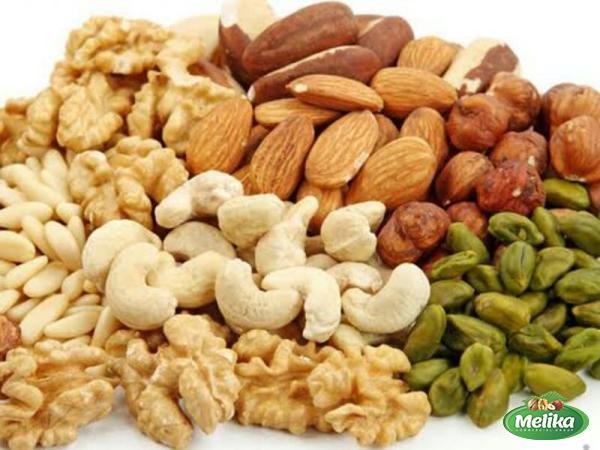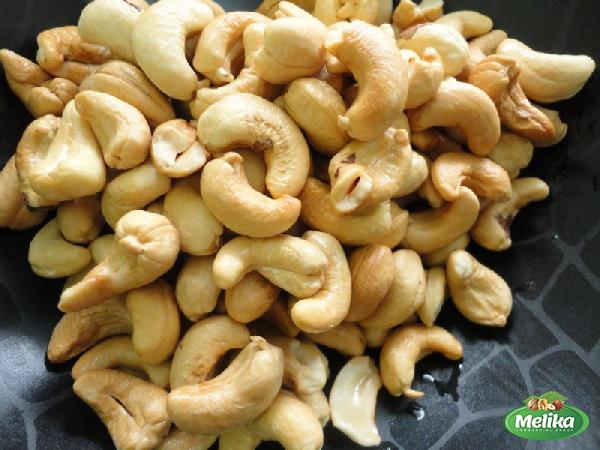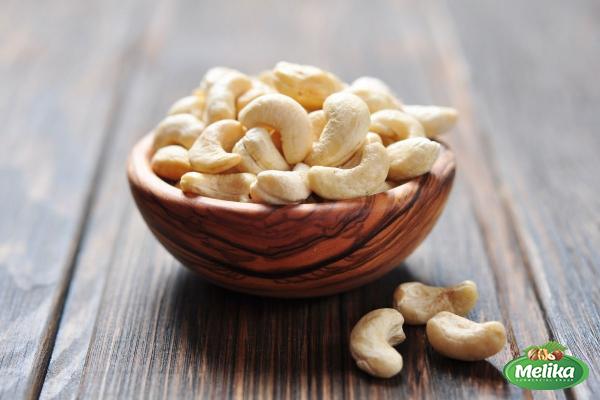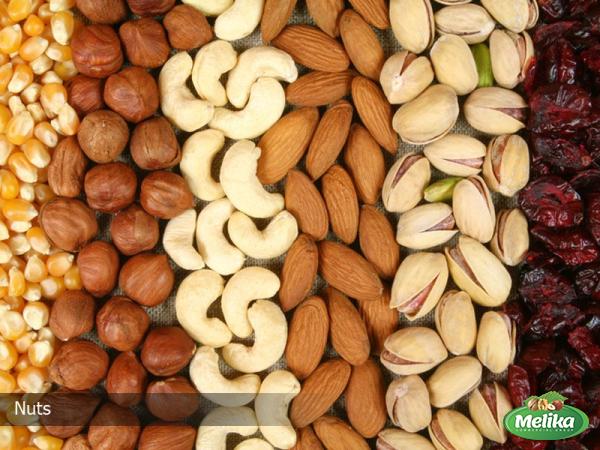Unshelled cashew nuts, also known as raw cashews, are a popular snack and versatile ingredient in various culinary endeavors. Native to Brazil, cashew nuts have gained global popularity due to their rich flavor, nutritional benefits, and multiple uses in both sweet and savory dishes. Unshelled cashew nuts, as the name implies, are cashews that have not been shelled or processed. They are commonly found in their natural state, encased in a hard shell that protects the delicate kernel inside. To access the edible part of the cashew nut, the shell needs to be carefully removed, revealing the cashew kernel, or nutmeat, which can be consumed in a variety of ways. Cashew nuts are renowned for their unique shape and rich, buttery taste. Their versatility allows them to be enjoyed both as a standalone snack and as an ingredient in various dishes, including desserts, salads, stir-fries, and even vegan cheese alternatives. One of the main reasons unshelled cashews are popular is because they can be used to make cashew milk, a non-dairy alternative to traditional cow’s milk. Cashew milk has gained popularity among those with lactose intolerance or individuals following a vegan or plant-based diet. It can be easily made at home by blending soaked cashews with water and optional sweeteners or flavorings. Apart from their culinary uses, unshelled cashew nuts offer several health benefits. Cashews are a good source of plant-based proteins and healthy fats, including monounsaturated fats and omega-3 fatty acids. They also contain important minerals such as magnesium, phosphorus, copper, and zinc.

nuts
 Additionally, cashews are rich in antioxidants, which help protect against cellular damage and reduce the risk of chronic diseases. Consuming cashews in moderation has been linked to various health benefits. Research suggests that including cashews in a balanced diet may help improve heart health by reducing bad cholesterol levels, lowering blood pressure, and promoting healthy blood vessel function. Cashews also contain compounds like phytosterols and polyphenols, which have been associated with potential anti-inflammatory and anticancer properties. Despite their numerous benefits, it is important to note that cashew nuts are calorie-dense and should be consumed in moderation, especially for those watching their calorie intake. Additionally, some individuals may have allergies or sensitivities to cashew nuts, and caution should be exercised when introducing them into the diet. Unshelled cashew nuts are not only beneficial for the human body but also have a positive impact on the environment. Cashew trees are drought-resistant and can thrive in tropical climates, making them an ideal crop for regions facing water scarcity. The production of cashews also serves as a source of income for many small-scale farmers in developing countries, contributing to their livelihoods and the local economy. In recent years, the demand for unshelled cashews has been steadily increasing, driven by their nutritional profile, versatility, and rising popularity of plant-based diets. As a result, cashew nut production has seen significant growth, particularly in countries like India, Vietnam, and Brazil, which are major exporters of cashew nuts. The cashew industry, however, faces certain challenges. The labor-intensive process of shelling cashews can be time-consuming and costly. Additionally, the cashew shell contains a toxic resin known as urushiol, which can cause skin irritations and allergic reactions. Proper precautions and safety measures are necessary during the shelling process to protect workers and consumers from these potential hazards. In conclusion, unshelled cashew nuts offer a delightful taste and numerous health benefits, making them a popular choice among consumers. From snacking to cooking, their versatility allows for endless possibilities in the kitchen.
Additionally, cashews are rich in antioxidants, which help protect against cellular damage and reduce the risk of chronic diseases. Consuming cashews in moderation has been linked to various health benefits. Research suggests that including cashews in a balanced diet may help improve heart health by reducing bad cholesterol levels, lowering blood pressure, and promoting healthy blood vessel function. Cashews also contain compounds like phytosterols and polyphenols, which have been associated with potential anti-inflammatory and anticancer properties. Despite their numerous benefits, it is important to note that cashew nuts are calorie-dense and should be consumed in moderation, especially for those watching their calorie intake. Additionally, some individuals may have allergies or sensitivities to cashew nuts, and caution should be exercised when introducing them into the diet. Unshelled cashew nuts are not only beneficial for the human body but also have a positive impact on the environment. Cashew trees are drought-resistant and can thrive in tropical climates, making them an ideal crop for regions facing water scarcity. The production of cashews also serves as a source of income for many small-scale farmers in developing countries, contributing to their livelihoods and the local economy. In recent years, the demand for unshelled cashews has been steadily increasing, driven by their nutritional profile, versatility, and rising popularity of plant-based diets. As a result, cashew nut production has seen significant growth, particularly in countries like India, Vietnam, and Brazil, which are major exporters of cashew nuts. The cashew industry, however, faces certain challenges. The labor-intensive process of shelling cashews can be time-consuming and costly. Additionally, the cashew shell contains a toxic resin known as urushiol, which can cause skin irritations and allergic reactions. Proper precautions and safety measures are necessary during the shelling process to protect workers and consumers from these potential hazards. In conclusion, unshelled cashew nuts offer a delightful taste and numerous health benefits, making them a popular choice among consumers. From snacking to cooking, their versatility allows for endless possibilities in the kitchen.
Specifications of nuts
 As the demand for plant-based alternatives continues to rise, unshelled cashew nuts are likely to maintain their position as a versatile and nutritious ingredient in the culinary world.Title: The Business of Unshelled Cashew Nuts: Growth, Challenges, and Opportunities Introduction: The market for unshelled cashew nuts has experienced significant growth in recent years, driven by rising consumer demand for nutritious snacks and plant-based alternatives. In this article, we explore the business aspects surrounding unshelled cashews, including production, global market trends, challenges faced by the industry, and potential opportunities for growth. 1. Global Production and Market Overview: Unshelled cashew nuts are primarily produced in countries such as India, Vietnam, Brazil, and Ivory Coast. India has emerged as the largest producer, accounting for a significant share of the global market. Cashew production in these countries heavily relies on small-scale farmers, who contribute to both local economies and global supply chains. The global market for unshelled cashew nuts has witnessed consistent growth due to their versatility and nutritional benefits. Consumer preferences for healthier snacking options, alongside the popularity of plant-based diets, have fueled the demand for cashews as a go-to ingredient in various culinary applications. 2. Processing and Value Addition: While unshelled cashew nuts can be consumed as a snack or used in cooking, value-added processing techniques have gained traction in the market. These processes involve roasting, flavoring, and packaging cashews for retail sale. Value-added products like flavored cashews or cashew nut butter have gained popularity, presenting an opportunity for businesses to cater to specific consumer preferences. 3. Sustainability and Ethical Sourcing: Consumers are increasingly concerned about the sustainability and ethical sourcing of their food products. This trend has also extended to the cashew industry. Businesses that prioritize sustainable farming practices, fair trade certifications, and support for small-scale farmers stand to gain a competitive advantage. 4. Nutritional Trends and Health Benefits: Unshelled cashew nuts are not just a tasty snack; they are also packed with essential nutrients. Cashews are a good source of plant-based proteins, healthy fats, vitamins, and minerals. The growing consumer awareness of the health benefits associated with cashews, such as improving heart health and reducing the risk of chronic diseases, presents an opportunity for businesses to market their products as a healthy alternative.
As the demand for plant-based alternatives continues to rise, unshelled cashew nuts are likely to maintain their position as a versatile and nutritious ingredient in the culinary world.Title: The Business of Unshelled Cashew Nuts: Growth, Challenges, and Opportunities Introduction: The market for unshelled cashew nuts has experienced significant growth in recent years, driven by rising consumer demand for nutritious snacks and plant-based alternatives. In this article, we explore the business aspects surrounding unshelled cashews, including production, global market trends, challenges faced by the industry, and potential opportunities for growth. 1. Global Production and Market Overview: Unshelled cashew nuts are primarily produced in countries such as India, Vietnam, Brazil, and Ivory Coast. India has emerged as the largest producer, accounting for a significant share of the global market. Cashew production in these countries heavily relies on small-scale farmers, who contribute to both local economies and global supply chains. The global market for unshelled cashew nuts has witnessed consistent growth due to their versatility and nutritional benefits. Consumer preferences for healthier snacking options, alongside the popularity of plant-based diets, have fueled the demand for cashews as a go-to ingredient in various culinary applications. 2. Processing and Value Addition: While unshelled cashew nuts can be consumed as a snack or used in cooking, value-added processing techniques have gained traction in the market. These processes involve roasting, flavoring, and packaging cashews for retail sale. Value-added products like flavored cashews or cashew nut butter have gained popularity, presenting an opportunity for businesses to cater to specific consumer preferences. 3. Sustainability and Ethical Sourcing: Consumers are increasingly concerned about the sustainability and ethical sourcing of their food products. This trend has also extended to the cashew industry. Businesses that prioritize sustainable farming practices, fair trade certifications, and support for small-scale farmers stand to gain a competitive advantage. 4. Nutritional Trends and Health Benefits: Unshelled cashew nuts are not just a tasty snack; they are also packed with essential nutrients. Cashews are a good source of plant-based proteins, healthy fats, vitamins, and minerals. The growing consumer awareness of the health benefits associated with cashews, such as improving heart health and reducing the risk of chronic diseases, presents an opportunity for businesses to market their products as a healthy alternative.
buy nuts
 5. Export and Import Trends: Global demand for unshelled cashew nuts has led to a thriving export market. Importing countries, particularly the United States and European nations, rely on consistent and high-quality supplies to meet their consumer needs. Ensuring timely delivery, adhering to quality standards, and maintaining traceability throughout the supply chain are crucial for businesses operating in the export sector. 6. Packaging and Branding: In a competitive market, packaging and branding play a vital role in attracting consumers. Eye-catching designs, informative labeling, and sustainable packaging materials can make a brand stand out among competitors. Businesses should consider investing in appealing packaging solutions that communicate the product’s quality, nutritional benefits, and sustainability commitments. 7. Supply Chain Challenges: The cashew industry faces several challenges related to its supply chain. One of the most significant hurdles is the labor-intensive process of shelling cashews. Businesses must invest in efficient equipment or explore innovative technologies to streamline this process, reduce costs, and improve productivity. Additionally, ensuring adequate storage facilities and efficient logistics are crucial for maintaining the quality and freshness of unshelled cashews during transportation. 8. Food Safety and Quality Control: Food safety regulations and quality control standards are critical for the success of any food-related business. In the case of unshelled cashew nuts, comprehensive and rigorous quality control measures are necessary to detect and prevent contamination or spoilage. Implementing proper hygiene practices, adhering to food safety certifications, and conducting regular audits are essential to maintain consumer trust. 9. Innovation and Product Development: To stay competitive in the market, businesses must continuously innovate and develop new products or variations of existing ones. This can include introducing novel flavors, exploring unique culinary applications, and even venturing into the emerging market of cashew-based alternatives to dairy products. Keeping a pulse on consumer trends and preferences is vital for businesses looking to capitalize on new opportunities. 10. Marketing and Distribution Strategies: Successful marketing and distribution strategies are crucial for businesses operating in the unshelled cashew nut industry. Creating awareness about the nutritional benefits of cashews, promoting product versatility, and targeting specific consumer segments, such as health-conscious individuals or vegans, can help boost sales. Effective distribution channels, both online and offline, ensure products reach the intended market efficiently. Conclusion: The business of unshelled cashew nuts presents numerous opportunities for growth, innovation, and sustainability. With rising consumer demand for nutritious and versatile snacks, businesses operating in this industry must focus on product quality, efficient supply chain management, food safety, and ethical sourcing. By addressing these challenges and capitalizing on emerging market trends, companies can carve a niche in the competitive and expanding market for unshelled cashew nuts.
5. Export and Import Trends: Global demand for unshelled cashew nuts has led to a thriving export market. Importing countries, particularly the United States and European nations, rely on consistent and high-quality supplies to meet their consumer needs. Ensuring timely delivery, adhering to quality standards, and maintaining traceability throughout the supply chain are crucial for businesses operating in the export sector. 6. Packaging and Branding: In a competitive market, packaging and branding play a vital role in attracting consumers. Eye-catching designs, informative labeling, and sustainable packaging materials can make a brand stand out among competitors. Businesses should consider investing in appealing packaging solutions that communicate the product’s quality, nutritional benefits, and sustainability commitments. 7. Supply Chain Challenges: The cashew industry faces several challenges related to its supply chain. One of the most significant hurdles is the labor-intensive process of shelling cashews. Businesses must invest in efficient equipment or explore innovative technologies to streamline this process, reduce costs, and improve productivity. Additionally, ensuring adequate storage facilities and efficient logistics are crucial for maintaining the quality and freshness of unshelled cashews during transportation. 8. Food Safety and Quality Control: Food safety regulations and quality control standards are critical for the success of any food-related business. In the case of unshelled cashew nuts, comprehensive and rigorous quality control measures are necessary to detect and prevent contamination or spoilage. Implementing proper hygiene practices, adhering to food safety certifications, and conducting regular audits are essential to maintain consumer trust. 9. Innovation and Product Development: To stay competitive in the market, businesses must continuously innovate and develop new products or variations of existing ones. This can include introducing novel flavors, exploring unique culinary applications, and even venturing into the emerging market of cashew-based alternatives to dairy products. Keeping a pulse on consumer trends and preferences is vital for businesses looking to capitalize on new opportunities. 10. Marketing and Distribution Strategies: Successful marketing and distribution strategies are crucial for businesses operating in the unshelled cashew nut industry. Creating awareness about the nutritional benefits of cashews, promoting product versatility, and targeting specific consumer segments, such as health-conscious individuals or vegans, can help boost sales. Effective distribution channels, both online and offline, ensure products reach the intended market efficiently. Conclusion: The business of unshelled cashew nuts presents numerous opportunities for growth, innovation, and sustainability. With rising consumer demand for nutritious and versatile snacks, businesses operating in this industry must focus on product quality, efficient supply chain management, food safety, and ethical sourcing. By addressing these challenges and capitalizing on emerging market trends, companies can carve a niche in the competitive and expanding market for unshelled cashew nuts.











Your comment submitted.